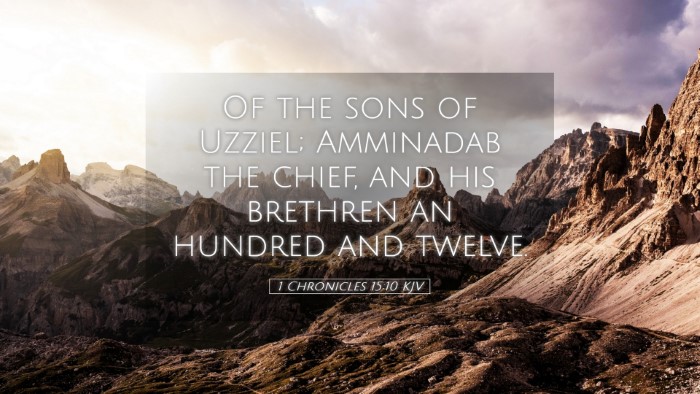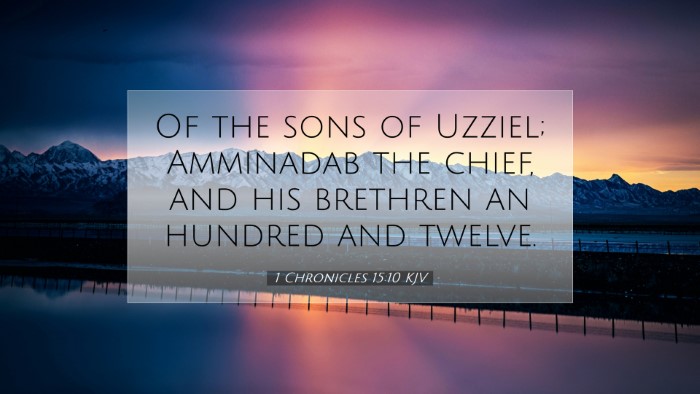Commentary on 1 Chronicles 15:10
Verse: 1 Chronicles 15:10 - "Of the sons of Uzziel; Michah the chief, and his brethren an hundred and twenty."
Contextual Overview
This verse unfolds during a crucial moment in Israel’s history, notably in the transport of the Ark of the Covenant to Jerusalem under King David. The preparation and orchestration of this event are critical for understanding David's desire for the centralization of worship and the restoration of Israel’s religious identity.
Insights from Commentaries
Matthew Henry's Commentary
Matthew Henry discusses the importance of the Ark and its transportation, emphasizing the holiness associated with it. He notes:
- The Ark represented God’s presence among His people, making it essential to treat it with reverence.
- David's desire to bring it to Jerusalem underscored the significance of worship being at the center of national life.
- Henry points out that involving the right leaders and priests, such as Michah, reflects the order and reverence required in serving God.
Henry accurately highlights the responsibility laid upon the shoulders of the leaders, emphasizing that their faithfulness was paramount in the Holy service.
Albert Barnes' Notes on the Bible
Albert Barnes provides a more detailed explanation of Michah's lineage, focusing on who Uzziel was:
- Uzziel was one of the sons of Kohath, a key figure within the Levitical priesthood.
- Michah, as a chief among his brethren, indicates a role of leadership and authority that was crucial for the task at hand.
Barnes connects this passage with the greater narrative of Israel’s worship and describes the significance of having numbered and organized leaders who were dedicated to God’s service.
Adam Clarke's Commentary
Adam Clarke also emphasizes the organization of the Levites in this verse:
- He elaborates that such detailed attention to the list of names signifies the recognition of each individual's role in the worship process.
- Clarke draws attention to the number "one hundred and twenty", highlighting it as indicative of the importance of participation in worship. The number itself is often symbolic of completeness or divine order.
Clarke also stresses the necessity for devotion and established order in the worship of God, through trained and selected individuals.
Theological Implications
From the insights provided by these scholars, several theological implications can be discerned:
- Divine Presence: The Ark signifies God's presence, particularly as it returns to Jerusalem. Understanding this underscores the need for leaders to maintain a close relationship with God.
- Order in Worship: The meticulous record of leaders reflects the heart of true worship, where order is as essential as devotion.
- Community Role: Leaders like Michah serve as role models for the people; their commitment is a vital part of leading others in their faith.
Conclusion
1 Chronicles 15:10 encapsulates a vital moment in Israel's history, representing God's order in worship through dedicated leaders. The insights drawn from the public domain commentaries underscore the need for reverence, organization, and commitment in the service of God. For pastors, theologians, and scholars, this verse offers a foundational principle for worshiping God in a manner that is in accordance with His holiness and order.


